
Accelerator Centre marks a decade of innovation
Startup partnership a critical piece of Waterloo’s entrepreneurial ecosystem

Startup partnership a critical piece of Waterloo’s entrepreneurial ecosystem
By Staff University RelationsA critical partner in Waterloo’s entrepreneurial ecosystem marks 10 years of startup support on May 17 and 18, with an open house and gala.
Located on the University of Waterloo’s north campus, the Accelerator Centre opened its doors on May 18, 2006. Originally launched by the University, federal, provincial, regional and city governments, the centre now counts Wilfrid Laurier University, Conestoga College, University of Guelph and several economic development and technology organizations as partners.

Offering office space, mentorship and startup services, the centre accelerates the growth of new technology companies and promotes commercialization of academic research. Chief executive office, Paul Salvini, also serves as associate vice-president of research commercialization in the University.
The relationship between the University and the Accelerator Centre stands as an example of the connections that make the regional ecosystem so strong, says Feridun Hamdullahpur, president and vice-chancellor of Waterloo.
“It’s been a great 10 years for our community and the Accelerator Centre. The Waterloo region is indisputably a rising, global innovation hub,” Hamdullahpur said. “Acceleration is a key part of making that happen.”
On hand for Tuesday’s open house will be His Excellency the Right Honorable David Johnston, Governor General of Canada. Johnston will also tour Waterloo’s Conrad Centre for Business, Entrepreneurship and Technology during the visit to a campus he knows well. In 2006, as president and vice-chancellor of the University of Waterloo, he served as a founding partner of the Accelerator Centre, in the research and technology park that bears his name.
Since then, the centre has supported hundreds of local entrepreneurs and companies — with 51 graduating from the program. It’s added a second location at the University’s Stratford campus, helping to connect digital startups with commercial opportunities.
“The commercial successes we’ve seen emerge from the Accelerator Centre and this region over the past 10 years have been remarkable,” Salvini said. “The talent and drive coming out of local research facilities and startups is fueling Waterloo’s international reputation as an innovation powerhouse. The next 10 years will see our innovators build that reputation with new companies, technology and research.”
Accelerator Centre graduates include University professors, students and alumni. Among the standouts:

Read more
Many Hearts, One Mind by Indigenous artist Alanah Jewell celebrates the act of creation shared by the Land and innovators in our community

Read more
Redefining capstone learning by bringing students, faculty and community partners together to tackle real-world challenges

Read more
Here are the people and events behind some of this year’s most compelling Waterloo stories
The University of Waterloo acknowledges that much of our work takes place on the traditional territory of the Neutral, Anishinaabeg, and Haudenosaunee peoples. Our main campus is situated on the Haldimand Tract, the land granted to the Six Nations that includes six miles on each side of the Grand River. Our active work toward reconciliation takes place across our campuses through research, learning, teaching, and community building, and is co-ordinated within the Office of Indigenous Relations.